外研版英语中考二轮语法专项——代词与连词 知识梳理+实战演练(含答案)
文档属性
| 名称 | 外研版英语中考二轮语法专项——代词与连词 知识梳理+实战演练(含答案) |
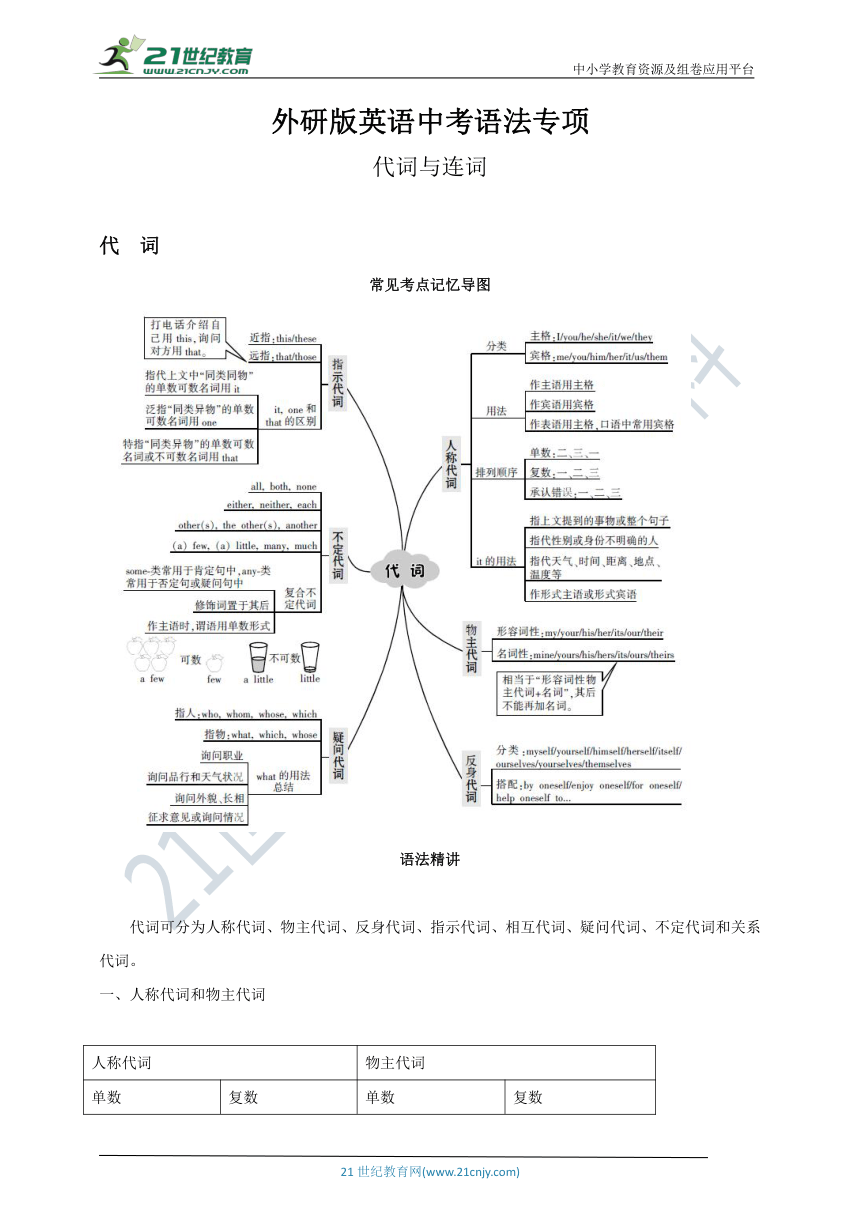
|
|
| 格式 | doc | ||
| 文件大小 | 1.5MB | ||
| 资源类型 | 试卷 | ||
| 版本资源 | 外研版 | ||
| 科目 | 英语 | ||
| 更新时间 | 2022-02-08 13:33:34 | ||
图片预览

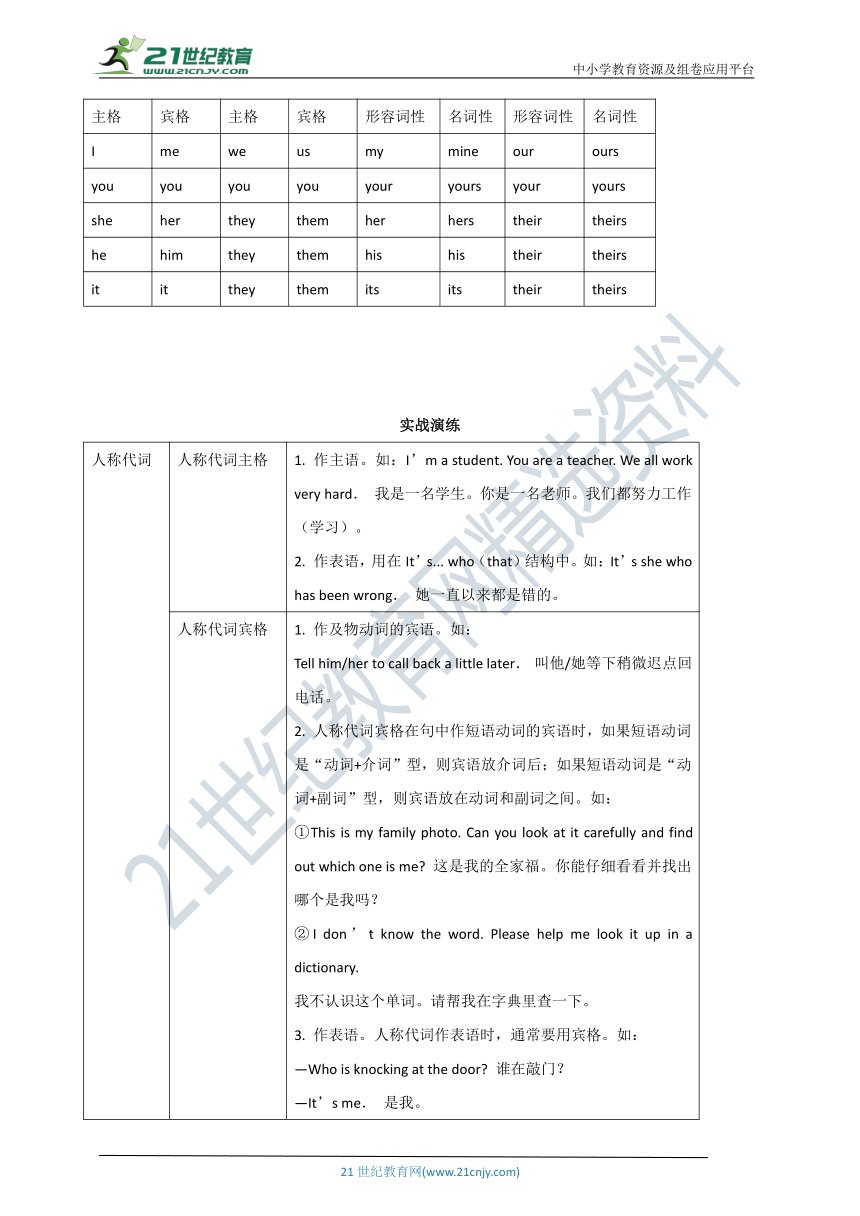
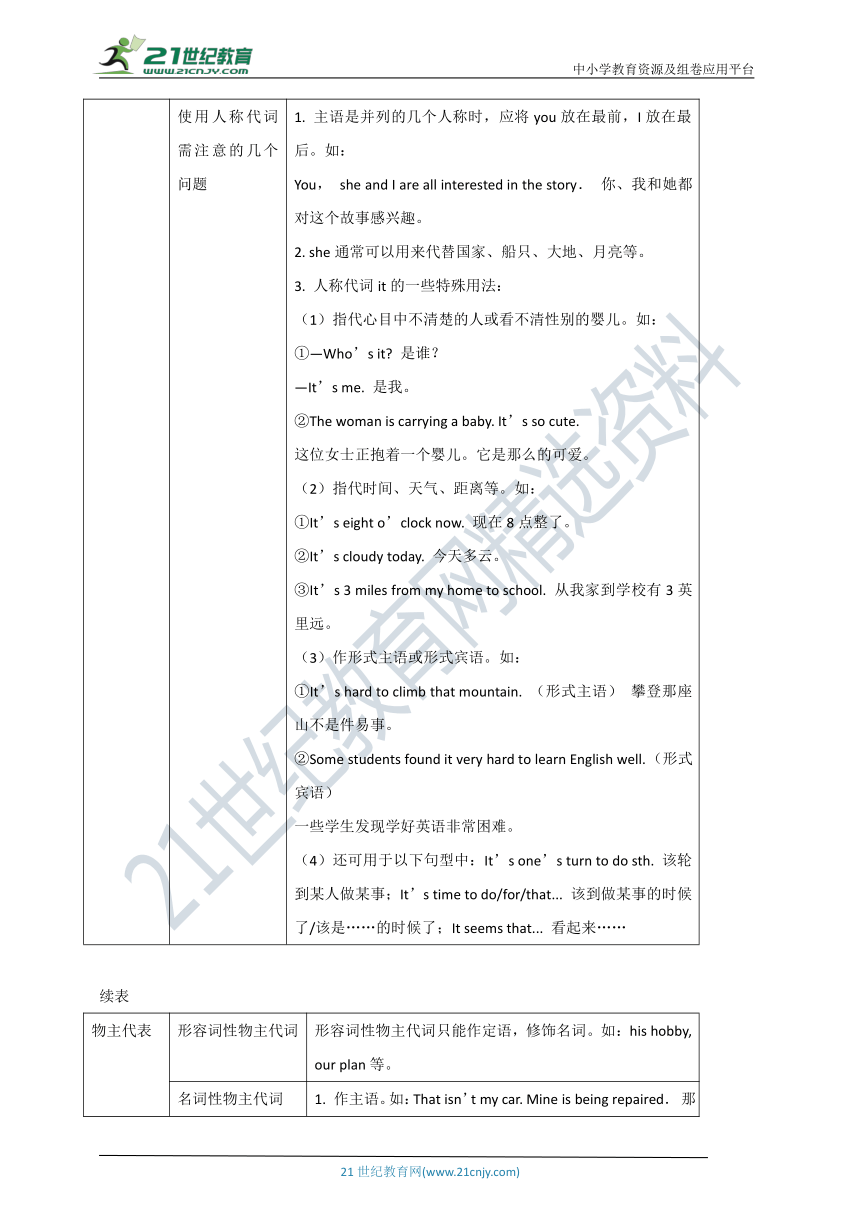
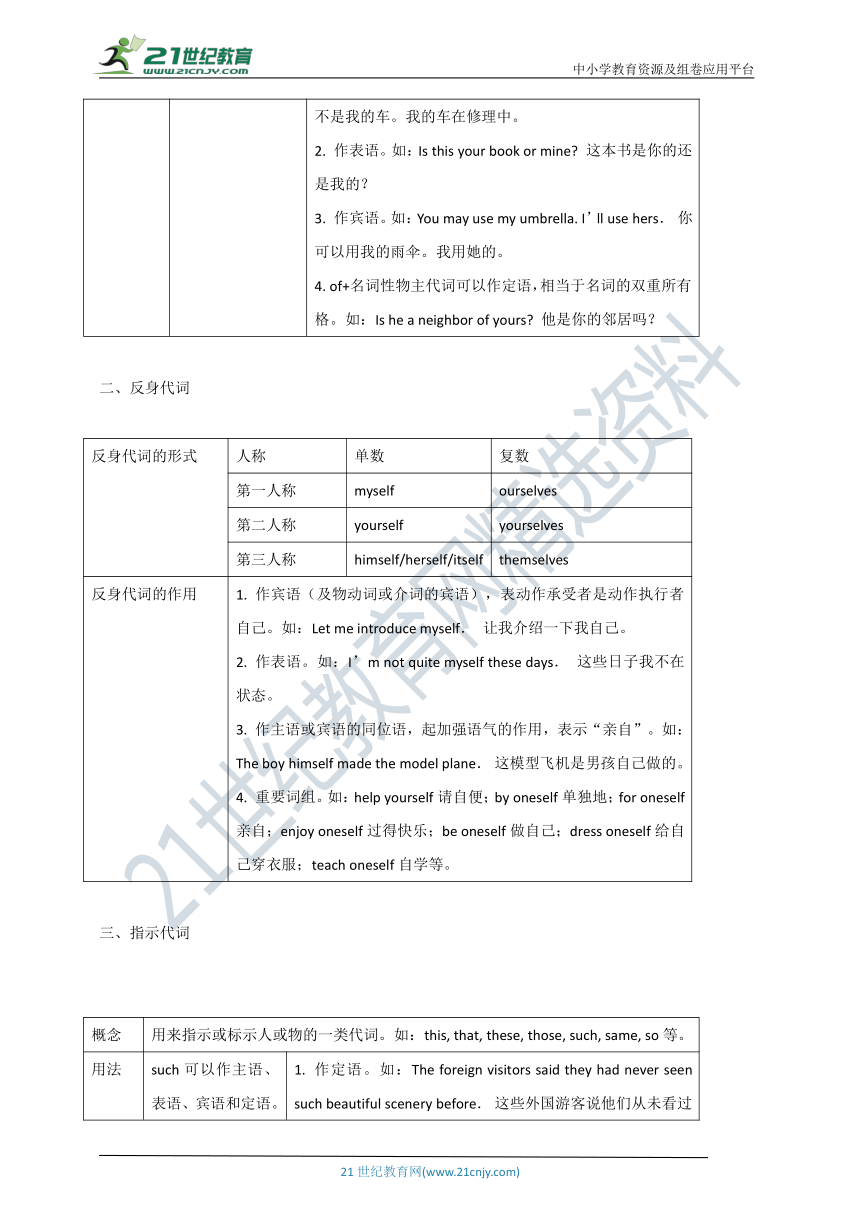
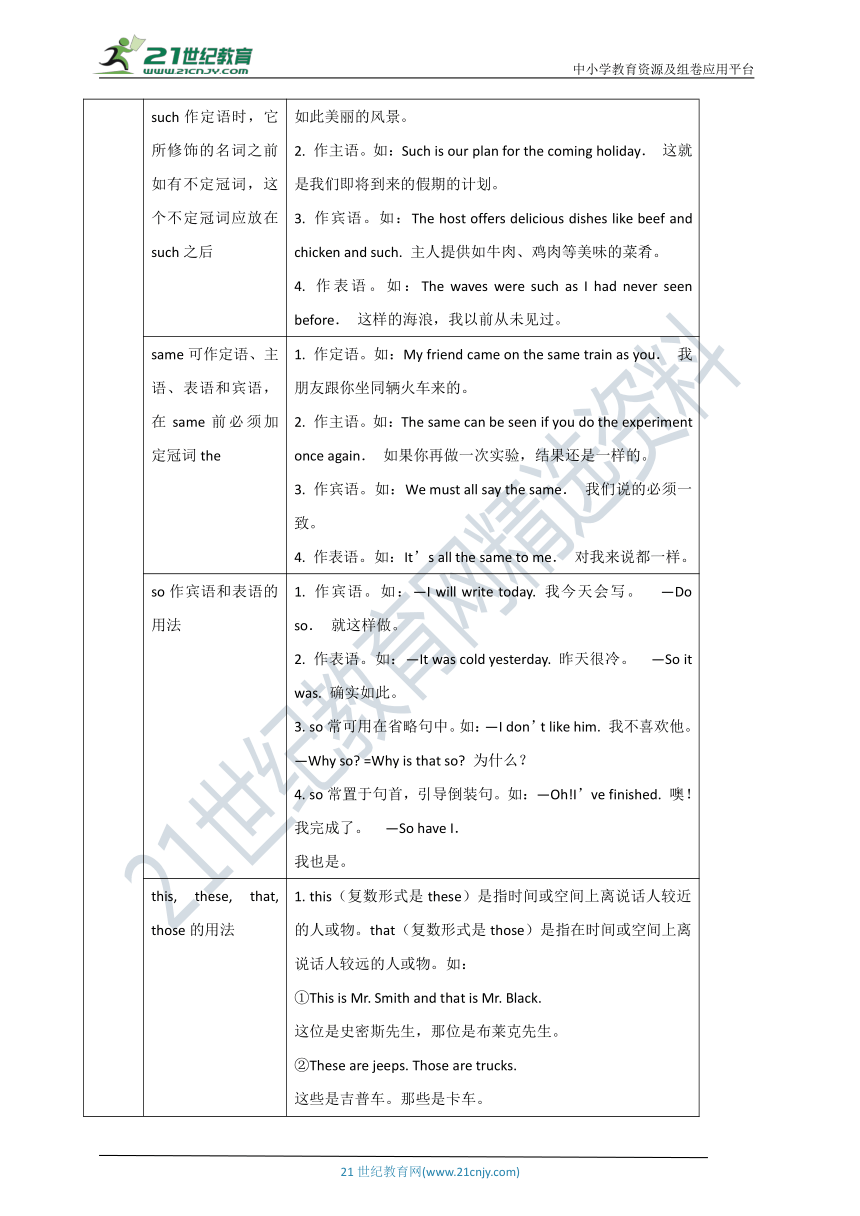
文档简介
中小学教育资源及组卷应用平台
外研版英语中考语法专项
代词与连词
代 词
常见考点记忆导图
语法精讲
代词可分为人称代词、物主代词、反身代词、指示代词、相互代词、疑问代词、不定代词和关系代词。
一、人称代词和物主代词
人称代词 物主代词
单数 复数 单数 复数
主格 宾格 主格 宾格 形容词性 名词性 形容词性 名词性
I me we us my mine our ours
you you you you your yours your yours
she her they them her hers their theirs
he him they them his his their theirs
it it they them its its their theirs
实战演练
人称代词 人称代词主格 1. 作主语。如:I’m a student. You are a teacher. We all work very hard. 我是一名学生。你是一名老师。我们都努力工作(学习)。2. 作表语,用在It’s... who(that)结构中。如:It’s she who has been wrong. 她一直以来都是错的。
人称代词宾格 1. 作及物动词的宾语。如:Tell him/her to call back a little later. 叫他/她等下稍微迟点回电话。2. 人称代词宾格在句中作短语动词的宾语时,如果短语动词是“动词+介词”型,则宾语放介词后;如果短语动词是“动词+副词”型,则宾语放在动词和副词之间。如:①This is my family photo. Can you look at it carefully and find out which one is me 这是我的全家福。你能仔细看看并找出哪个是我吗?②I don’t know the word. Please help me look it up in a dictionary.我不认识这个单词。请帮我在字典里查一下。3. 作表语。人称代词作表语时,通常要用宾格。如:—Who is knocking at the door 谁在敲门?—It’s me. 是我。
使用人称代词需注意的几个问题 1. 主语是并列的几个人称时,应将you放在最前,I放在最后。如:You, she and I are all interested in the story. 你、我和她都对这个故事感兴趣。2. she通常可以用来代替国家、船只、大地、月亮等。3. 人称代词it的一些特殊用法:(1)指代心目中不清楚的人或看不清性别的婴儿。如:①—Who’s it 是谁?—It’s me. 是我。②The woman is carrying a baby. It’s so cute. 这位女士正抱着一个婴儿。它是那么的可爱。(2)指代时间、天气、距离等。如:①It’s eight o’clock now. 现在8点整了。②It’s cloudy today. 今天多云。③It’s 3 miles from my home to school. 从我家到学校有3英里远。(3)作形式主语或形式宾语。如:①It’s hard to climb that mountain. (形式主语) 攀登那座山不是件易事。②Some students found it very hard to learn English well. (形式宾语) 一些学生发现学好英语非常困难。(4)还可用于以下句型中:It’s one’s turn to do sth. 该轮到某人做某事;It’s time to do/for/that... 该到做某事的时候了/该是……的时候了;It seems that... 看起来……
续表
物主代表 形容词性物主代词 形容词性物主代词只能作定语,修饰名词。如:his hobby, our plan等。
名词性物主代词 1. 作主语。如:That isn’t my car. Mine is being repaired. 那不是我的车。我的车在修理中。2. 作表语。如:Is this your book or mine 这本书是你的还是我的?3. 作宾语。如:You may use my umbrella. I’ll use hers. 你可以用我的雨伞。我用她的。4. of+名词性物主代词可以作定语,相当于名词的双重所有格。如:Is he a neighbor of yours 他是你的邻居吗?
二、反身代词
反身代词的形式 人称 单数 复数
第一人称 myself ourselves
第二人称 yourself yourselves
第三人称 himself/herself/itself themselves
反身代词的作用 1. 作宾语(及物动词或介词的宾语),表动作承受者是动作执行者自己。如:Let me introduce myself. 让我介绍一下我自己。2. 作表语。如:I’m not quite myself these days. 这些日子我不在状态。3. 作主语或宾语的同位语,起加强语气的作用,表示“亲自”。如:The boy himself made the model plane. 这模型飞机是男孩自己做的。4. 重要词组。如:help yourself请自便;by oneself单独地;for oneself亲自;enjoy oneself过得快乐;be oneself做自己;dress oneself给自己穿衣服;teach oneself自学等。
三、指示代词
概念 用来指示或标示人或物的一类代词。如:this, that, these, those, such, same, so等。
用法 such可以作主语、表语、宾语和定语。such作定语时,它所修饰的名词之前如有不定冠词,这个不定冠词应放在such之后 1. 作定语。如:The foreign visitors said they had never seen such beautiful scenery before. 这些外国游客说他们从未看过如此美丽的风景。2. 作主语。如:Such is our plan for the coming holiday. 这就是我们即将到来的假期的计划。3. 作宾语。如:The host offers delicious dishes like beef and chicken and such. 主人提供如牛肉、鸡肉等美味的菜肴。4. 作表语。如:The waves were such as I had never seen before. 这样的海浪,我以前从未见过。
same可作定语、主语、表语和宾语,在same前必须加定冠词the 1. 作定语。如:My friend came on the same train as you. 我朋友跟你坐同辆火车来的。2. 作主语。如:The same can be seen if you do the experiment once again. 如果你再做一次实验,结果还是一样的。3. 作宾语。如:We must all say the same. 我们说的必须一致。4. 作表语。如:It’s all the same to me. 对我来说都一样。
so作宾语和表语的用法 1. 作宾语。如:—I will write today. 我今天会写。 —Do so. 就这样做。2. 作表语。如:—It was cold yesterday. 昨天很冷。 —So it was. 确实如此。3. so常可用在省略句中。如:—I don’t like him. 我不喜欢他。 —Why so =Why is that so 为什么?4. so常置于句首,引导倒装句。如:—Oh!I’ve finished. 噢!我完成了。 —So have I.我也是。
this, these, that, those的用法 1. this(复数形式是these)是指时间或空间上离说话人较近的人或物。that(复数形式是those)是指在时间或空间上离说话人较远的人或物。如:①This is Mr. Smith and that is Mr. Black. 这位是史密斯先生,那位是布莱克先生。②These are jeeps. Those are trucks. 这些是吉普车。那些是卡车。2. that/those有时用来代替前面说过的名词,以避免重复。如:①The weather in Shanghai is not so cold as that (=the weather) in Beijing. 上海的天气没有北京那么冷。②The apples in this basket are bigger than those in that basket.这只篮子里的苹果比那只篮子里的苹果大。
四、不定代词
概念 不明确指代某个人或事物、某些人或事物的代词叫不定代词。不定代词主要有all, each, every, both, either,neither, one, none, little, few, many, much, other, another, some, any, no,还有由some, any, no和every构成的合成代词。不定代词在句中可以作主语、宾语、表语、定语、同位语等。
用法 one的用法 1. 指不定人称时,表人,意为“一个人;人人”,其反身代词为oneself,物主代词为one’s。如:One has to do one’s best. 人人都要尽力而为。2. 代替前面出现过的可数名词,以免出现重复,复数形式为ones,可与冠词连用,可以有自己的定语。如:Please pass me the book, the one on the top shelf. 帮我递下那本书,在顶层架子上。
some与any的用法区别 1. some和any都可在句中作主语、宾语和定语。some常用在肯定句中,any常用在疑问句和否定句中。如:My son needs some color paper. Do you have any 我儿子需要一些彩纸。你有吗?2. any用于肯定句,表示强调,意为“任何”。如:Any student can ask me any question atany time. 任何学生在任意时间都可以问我任何问题。3. some也可用于疑问句中,表示请求、建议或表示说话人希望得到肯定的回答。如:Would you like some coffee 你要一些咖啡吗?
another, other, others, the other与the others的用法区别 1. another(=an other)表示“别的;另一个”,泛指众多中的一个,一般后面接单数名词,前面不加定冠词。如:This book is too difficult for me. Will you please give me anotherone 这本书对我来说太难了。你能给我另一本吗?2. the other表示“两个中的一个”,常与one连用。如:I have two pencils. One is red, and the other is blue. 我有两支铅笔。一支是红的,另一支是蓝的。3. other+复数名词=others(别的)。如:Some are listening to the radio. Others are watching TV. 一些在听广播。别的在看电视。4. the other+复数名词=the others(其余的,相当于the rest),指剩下的全部。如:Some of the students are from the north. The others (=The other students) are from the south. 一些学生来自北方。其余的都来自南方。
every和each的用法区别 every和each都是“每一个”的意思,形式上都是单数。区别如下:1. every只能作定语,而each兼有形容词和名词的作用,可作主语、定语、宾语和同位语。如:Each of the stories is very interesting.=Every/Each story is very interesting.每个故事都很有趣。2. 从数量上看,each用来指两个或两个以上的人或物中的一个,而every则指三个或三个以上的人或物中的一个。如:There are trees on each side of the road. 马路两旁都有树。(此处不能用every代替)
neither, none与either的用法区别 neither指两者中的任何一个都不,是单数;none指三者或三者以上中的任何一个都不,可以表示单数也可以表示复数;either指两个中的任何一个,有肯定意义。如:①—Which would you like, tea or coffee 你要茶还是咖啡? —Neither. Water, please. 都不要,水就行了。②None of them have/has been to America. 他们都没去过美国。③—Which would you like, tea or coffee 你要茶还是咖啡?—Either is OK. 任何一个都行。
little, a little, few和a few的用法区别 little, few表示“很少;很少几个”,含否定意义。a little, a few表示“有些;有几个”,含肯定意义。little, a little修饰或代替不可数名词;few, a few修饰或代替可数名词,它们可在句中作主语、宾语和定语。如:①Little (A little) has been done to prevent the air from being polluted.没有采取什么措施(采取了一些措施)来防止空气受到污染。(作主语)②Few (A few) of them know German. 他们中没几个(有几个)会德语。(作主语)
something, anything,nothing与everything及somebody, anybody, nobody与everybody的用法区别 1. 这些不定代词均为复合不定代词,something, anything, nothing和everything指物,它们在句中作主语时谓语动词应用单数形式。something和anything指“某物”,它们的区别与some和any的区别相同。nothing表示否定含义。而everything则表示“每件事物”。2. somebody, anybody, nobody和everybody用以指人。它们中的body均可改为one,它们的用法与something, anything, nothing和everything的用法相同。所有复合不定代词被形容词修饰时,形容词应放在它们之后。如:①—Do you have anything important to say for yourself 你有什么重要的事情要为你自己辩白的吗?—Nothing except sorry. 除了“对不起”之外,没什么好说的。②Someone is talking in class. Let’s ask them to stop. 有人在课堂上说话。我们叫他们停下来吧。
五、疑问代词
概念 疑问代词主要有who, whom, whose, which, what,它们用来构成特殊疑问句,位于句首。
用法 1. who, whom都表示“谁”,作主语时用who,作宾语时用whom。who在特殊疑问句中可以代替whom,当疑问词作介词宾语,且介词又置于句首时,只能用whom。whose通常不能单独使用,常用在名词前作定语。如:①Whose shoes are these 这些是谁的鞋?②Who is standing there 谁站在那儿?③Who(Whom) are you waiting for 你在等谁?④With whom did you talk just now 你刚才和谁谈话了?2. which, what在特殊疑问句中作定语时,后面必须紧跟一个名词。如:①Which class are you in 你在哪个班?②What map is this 这是一幅什么地图?
连 词
常见考点记忆导图
语法精讲
概念 连接词与词、短语与短语以及句子与句子的词叫连词。
分类 并列连词 1. 并列关系连接两个并列关系的词、短语或句子的连词。常见的有:and, or, as well as, not only... but also..., either...or..., both... and..., neither... nor...等。(1)both... and... 连接两个主语时,谓语动词要用复数。如:Both he and I are students. 他和我都是学生。(2)not only... but also... 连接两个主语时,谓语动词应与最近的主语在数上保持一致,即就近原则。如:Not only he but also I am a student. 不仅他,我也是学生。注:not only... but also... 引导的句子可转换成as well as连接的句子。如:The cat is not only naughty butalso cute.=The cat is cute as well as naughty. 这只猫不仅顽皮,也很可爱。(3)neither... nor... 连接两个主语时,谓语动词应与最近的主语在数上保持一致。如:Neither you nor he is right. 你和他都不对。(4)as well as与主语连用时,其谓语动词应与其前面的主语在数上保持一致。如:He as well as I is a student. 他是一名学生,我也是。2. 转折关系表示两个概念彼此之间有转折关系。常见的有but, yet, while等。如:Money is important, but it can’t buy everything. 钱很重要,但买不到一切。3. 选择关系表示两者之间选择其一。常见的有:either... or..., or, or else等。如:①Either you or he is right. (就近原则) 要么你对,要么他对。②Be quick, or you will miss the bus. 快点,否则你将错过这班车。
从属连词 概念 从属连词是连接状语从句、宾语从句以及其他从句的连词。
引导状语从句的连词 详见第33课“状语从句”
引导宾语从句的连词 详见第32课“宾语从句”
续表
分类 从属连词 不能同时出现在一个句子中的连词 1. because, so不能同时在一个句子里,只用其一,汉语翻译仍然是“因为……所以……”。如:Everyone in our school knew him, so we had no trouble in finding him.=Because everyone in our school knew him, we had no trouble in finding him. 因为我们学校每个人都认识他,所以我们没费一点事就找到了他。2. though(although), but不能同时出现在一个句子里,只用其一即可,汉语仍译为“虽然……但是……”。但though可以和yet同时出现在一个句子中,这里的yet是副词,不是连词。如:Though Australia is very large, the population is quite small.=Australia is very large, but the population is quite small.=Though Australia is very large, yet the population is quite small. 虽然澳大利亚地广,但人口稀少。
实战演练
根据句意或所给单词提示,用适当的连词或代词填空
A组
1. (温州中考)—Can you play volleyball or basketball
—______________ of them. I’m good at ball games.
2. (金华、丽水中考)He gives lessons to_____________ (he) students about American history.
3. (杭州中考)_____________ the traffic was heavy, we got to the railway station on time.
4. (连云港中考)After the new high-speed railway line began operations, the time on the trip from Lianyungang to Qingdao now is much less than______________ in the past.
5. We have made______________ a rule to read aloud in the morning.
6. (丽水中考)I’ve been busy with the course and making new friends___________ I got here.
7. No driver is needed. The new car can run by______________(it).
8. Kids, help______________ (you) to some fruit. It’s good for your health.
9. My brother is old enough to look after______________(he).
10. We enjoyed______________ (us) at the party yesterday.
B组
11. —Hi, Jack!A dictionary is on the teacher’s desk.______________ is it
—I think it’s Mary’s, because her name is on the dictionary.
12. —Who’s that girl over there
—She’s Susan, a classmate of______________ (I).
13. Oh, dear!My computer doesn’t work. Would you please lend me______________ (you)
14. —Are these books yours, Mike
—No, they aren’t. They belong to______________ (she).
15. Uncle Tom will visit us soon.______________ (his) is arriving tomorrow morning.
16. I have a pet dog.______________ (it) name is Xiaohuan.
17. Nobody knows______________ he will come to join us or not.
18. Jessi is reading in the study______________ her sister Carol is watching TV in the living room.
19. It rained so heavily______________ I couldn’t go out.
20. Write clearly____________________________ your teacher can understand you correctly.
21. The child has studied English for two years______________ he went to middle school.
22.______________ they want to stay with us, my mother can cook for them.
参考答案
第28课 代词与连词
实战演练
1. Both 2. his 3. Although 4. that 5. it 6. since 7. itself
8. yourselves 9. himself 10. ourselves 11. Whose 12. mine
13. yours 14. her 15. He 16. Its 17. whether 18. while
19. that 20. so that 21. since 22. If
21世纪教育网 www.21cnjy.com 精品试卷·第 2 页 (共 2 页)
HYPERLINK "http://21世纪教育网(www.21cnjy.com)
" 21世纪教育网(www.21cnjy.com)
外研版英语中考语法专项
代词与连词
代 词
常见考点记忆导图
语法精讲
代词可分为人称代词、物主代词、反身代词、指示代词、相互代词、疑问代词、不定代词和关系代词。
一、人称代词和物主代词
人称代词 物主代词
单数 复数 单数 复数
主格 宾格 主格 宾格 形容词性 名词性 形容词性 名词性
I me we us my mine our ours
you you you you your yours your yours
she her they them her hers their theirs
he him they them his his their theirs
it it they them its its their theirs
实战演练
人称代词 人称代词主格 1. 作主语。如:I’m a student. You are a teacher. We all work very hard. 我是一名学生。你是一名老师。我们都努力工作(学习)。2. 作表语,用在It’s... who(that)结构中。如:It’s she who has been wrong. 她一直以来都是错的。
人称代词宾格 1. 作及物动词的宾语。如:Tell him/her to call back a little later. 叫他/她等下稍微迟点回电话。2. 人称代词宾格在句中作短语动词的宾语时,如果短语动词是“动词+介词”型,则宾语放介词后;如果短语动词是“动词+副词”型,则宾语放在动词和副词之间。如:①This is my family photo. Can you look at it carefully and find out which one is me 这是我的全家福。你能仔细看看并找出哪个是我吗?②I don’t know the word. Please help me look it up in a dictionary.我不认识这个单词。请帮我在字典里查一下。3. 作表语。人称代词作表语时,通常要用宾格。如:—Who is knocking at the door 谁在敲门?—It’s me. 是我。
使用人称代词需注意的几个问题 1. 主语是并列的几个人称时,应将you放在最前,I放在最后。如:You, she and I are all interested in the story. 你、我和她都对这个故事感兴趣。2. she通常可以用来代替国家、船只、大地、月亮等。3. 人称代词it的一些特殊用法:(1)指代心目中不清楚的人或看不清性别的婴儿。如:①—Who’s it 是谁?—It’s me. 是我。②The woman is carrying a baby. It’s so cute. 这位女士正抱着一个婴儿。它是那么的可爱。(2)指代时间、天气、距离等。如:①It’s eight o’clock now. 现在8点整了。②It’s cloudy today. 今天多云。③It’s 3 miles from my home to school. 从我家到学校有3英里远。(3)作形式主语或形式宾语。如:①It’s hard to climb that mountain. (形式主语) 攀登那座山不是件易事。②Some students found it very hard to learn English well. (形式宾语) 一些学生发现学好英语非常困难。(4)还可用于以下句型中:It’s one’s turn to do sth. 该轮到某人做某事;It’s time to do/for/that... 该到做某事的时候了/该是……的时候了;It seems that... 看起来……
续表
物主代表 形容词性物主代词 形容词性物主代词只能作定语,修饰名词。如:his hobby, our plan等。
名词性物主代词 1. 作主语。如:That isn’t my car. Mine is being repaired. 那不是我的车。我的车在修理中。2. 作表语。如:Is this your book or mine 这本书是你的还是我的?3. 作宾语。如:You may use my umbrella. I’ll use hers. 你可以用我的雨伞。我用她的。4. of+名词性物主代词可以作定语,相当于名词的双重所有格。如:Is he a neighbor of yours 他是你的邻居吗?
二、反身代词
反身代词的形式 人称 单数 复数
第一人称 myself ourselves
第二人称 yourself yourselves
第三人称 himself/herself/itself themselves
反身代词的作用 1. 作宾语(及物动词或介词的宾语),表动作承受者是动作执行者自己。如:Let me introduce myself. 让我介绍一下我自己。2. 作表语。如:I’m not quite myself these days. 这些日子我不在状态。3. 作主语或宾语的同位语,起加强语气的作用,表示“亲自”。如:The boy himself made the model plane. 这模型飞机是男孩自己做的。4. 重要词组。如:help yourself请自便;by oneself单独地;for oneself亲自;enjoy oneself过得快乐;be oneself做自己;dress oneself给自己穿衣服;teach oneself自学等。
三、指示代词
概念 用来指示或标示人或物的一类代词。如:this, that, these, those, such, same, so等。
用法 such可以作主语、表语、宾语和定语。such作定语时,它所修饰的名词之前如有不定冠词,这个不定冠词应放在such之后 1. 作定语。如:The foreign visitors said they had never seen such beautiful scenery before. 这些外国游客说他们从未看过如此美丽的风景。2. 作主语。如:Such is our plan for the coming holiday. 这就是我们即将到来的假期的计划。3. 作宾语。如:The host offers delicious dishes like beef and chicken and such. 主人提供如牛肉、鸡肉等美味的菜肴。4. 作表语。如:The waves were such as I had never seen before. 这样的海浪,我以前从未见过。
same可作定语、主语、表语和宾语,在same前必须加定冠词the 1. 作定语。如:My friend came on the same train as you. 我朋友跟你坐同辆火车来的。2. 作主语。如:The same can be seen if you do the experiment once again. 如果你再做一次实验,结果还是一样的。3. 作宾语。如:We must all say the same. 我们说的必须一致。4. 作表语。如:It’s all the same to me. 对我来说都一样。
so作宾语和表语的用法 1. 作宾语。如:—I will write today. 我今天会写。 —Do so. 就这样做。2. 作表语。如:—It was cold yesterday. 昨天很冷。 —So it was. 确实如此。3. so常可用在省略句中。如:—I don’t like him. 我不喜欢他。 —Why so =Why is that so 为什么?4. so常置于句首,引导倒装句。如:—Oh!I’ve finished. 噢!我完成了。 —So have I.我也是。
this, these, that, those的用法 1. this(复数形式是these)是指时间或空间上离说话人较近的人或物。that(复数形式是those)是指在时间或空间上离说话人较远的人或物。如:①This is Mr. Smith and that is Mr. Black. 这位是史密斯先生,那位是布莱克先生。②These are jeeps. Those are trucks. 这些是吉普车。那些是卡车。2. that/those有时用来代替前面说过的名词,以避免重复。如:①The weather in Shanghai is not so cold as that (=the weather) in Beijing. 上海的天气没有北京那么冷。②The apples in this basket are bigger than those in that basket.这只篮子里的苹果比那只篮子里的苹果大。
四、不定代词
概念 不明确指代某个人或事物、某些人或事物的代词叫不定代词。不定代词主要有all, each, every, both, either,neither, one, none, little, few, many, much, other, another, some, any, no,还有由some, any, no和every构成的合成代词。不定代词在句中可以作主语、宾语、表语、定语、同位语等。
用法 one的用法 1. 指不定人称时,表人,意为“一个人;人人”,其反身代词为oneself,物主代词为one’s。如:One has to do one’s best. 人人都要尽力而为。2. 代替前面出现过的可数名词,以免出现重复,复数形式为ones,可与冠词连用,可以有自己的定语。如:Please pass me the book, the one on the top shelf. 帮我递下那本书,在顶层架子上。
some与any的用法区别 1. some和any都可在句中作主语、宾语和定语。some常用在肯定句中,any常用在疑问句和否定句中。如:My son needs some color paper. Do you have any 我儿子需要一些彩纸。你有吗?2. any用于肯定句,表示强调,意为“任何”。如:Any student can ask me any question atany time. 任何学生在任意时间都可以问我任何问题。3. some也可用于疑问句中,表示请求、建议或表示说话人希望得到肯定的回答。如:Would you like some coffee 你要一些咖啡吗?
another, other, others, the other与the others的用法区别 1. another(=an other)表示“别的;另一个”,泛指众多中的一个,一般后面接单数名词,前面不加定冠词。如:This book is too difficult for me. Will you please give me anotherone 这本书对我来说太难了。你能给我另一本吗?2. the other表示“两个中的一个”,常与one连用。如:I have two pencils. One is red, and the other is blue. 我有两支铅笔。一支是红的,另一支是蓝的。3. other+复数名词=others(别的)。如:Some are listening to the radio. Others are watching TV. 一些在听广播。别的在看电视。4. the other+复数名词=the others(其余的,相当于the rest),指剩下的全部。如:Some of the students are from the north. The others (=The other students) are from the south. 一些学生来自北方。其余的都来自南方。
every和each的用法区别 every和each都是“每一个”的意思,形式上都是单数。区别如下:1. every只能作定语,而each兼有形容词和名词的作用,可作主语、定语、宾语和同位语。如:Each of the stories is very interesting.=Every/Each story is very interesting.每个故事都很有趣。2. 从数量上看,each用来指两个或两个以上的人或物中的一个,而every则指三个或三个以上的人或物中的一个。如:There are trees on each side of the road. 马路两旁都有树。(此处不能用every代替)
neither, none与either的用法区别 neither指两者中的任何一个都不,是单数;none指三者或三者以上中的任何一个都不,可以表示单数也可以表示复数;either指两个中的任何一个,有肯定意义。如:①—Which would you like, tea or coffee 你要茶还是咖啡? —Neither. Water, please. 都不要,水就行了。②None of them have/has been to America. 他们都没去过美国。③—Which would you like, tea or coffee 你要茶还是咖啡?—Either is OK. 任何一个都行。
little, a little, few和a few的用法区别 little, few表示“很少;很少几个”,含否定意义。a little, a few表示“有些;有几个”,含肯定意义。little, a little修饰或代替不可数名词;few, a few修饰或代替可数名词,它们可在句中作主语、宾语和定语。如:①Little (A little) has been done to prevent the air from being polluted.没有采取什么措施(采取了一些措施)来防止空气受到污染。(作主语)②Few (A few) of them know German. 他们中没几个(有几个)会德语。(作主语)
something, anything,nothing与everything及somebody, anybody, nobody与everybody的用法区别 1. 这些不定代词均为复合不定代词,something, anything, nothing和everything指物,它们在句中作主语时谓语动词应用单数形式。something和anything指“某物”,它们的区别与some和any的区别相同。nothing表示否定含义。而everything则表示“每件事物”。2. somebody, anybody, nobody和everybody用以指人。它们中的body均可改为one,它们的用法与something, anything, nothing和everything的用法相同。所有复合不定代词被形容词修饰时,形容词应放在它们之后。如:①—Do you have anything important to say for yourself 你有什么重要的事情要为你自己辩白的吗?—Nothing except sorry. 除了“对不起”之外,没什么好说的。②Someone is talking in class. Let’s ask them to stop. 有人在课堂上说话。我们叫他们停下来吧。
五、疑问代词
概念 疑问代词主要有who, whom, whose, which, what,它们用来构成特殊疑问句,位于句首。
用法 1. who, whom都表示“谁”,作主语时用who,作宾语时用whom。who在特殊疑问句中可以代替whom,当疑问词作介词宾语,且介词又置于句首时,只能用whom。whose通常不能单独使用,常用在名词前作定语。如:①Whose shoes are these 这些是谁的鞋?②Who is standing there 谁站在那儿?③Who(Whom) are you waiting for 你在等谁?④With whom did you talk just now 你刚才和谁谈话了?2. which, what在特殊疑问句中作定语时,后面必须紧跟一个名词。如:①Which class are you in 你在哪个班?②What map is this 这是一幅什么地图?
连 词
常见考点记忆导图
语法精讲
概念 连接词与词、短语与短语以及句子与句子的词叫连词。
分类 并列连词 1. 并列关系连接两个并列关系的词、短语或句子的连词。常见的有:and, or, as well as, not only... but also..., either...or..., both... and..., neither... nor...等。(1)both... and... 连接两个主语时,谓语动词要用复数。如:Both he and I are students. 他和我都是学生。(2)not only... but also... 连接两个主语时,谓语动词应与最近的主语在数上保持一致,即就近原则。如:Not only he but also I am a student. 不仅他,我也是学生。注:not only... but also... 引导的句子可转换成as well as连接的句子。如:The cat is not only naughty butalso cute.=The cat is cute as well as naughty. 这只猫不仅顽皮,也很可爱。(3)neither... nor... 连接两个主语时,谓语动词应与最近的主语在数上保持一致。如:Neither you nor he is right. 你和他都不对。(4)as well as与主语连用时,其谓语动词应与其前面的主语在数上保持一致。如:He as well as I is a student. 他是一名学生,我也是。2. 转折关系表示两个概念彼此之间有转折关系。常见的有but, yet, while等。如:Money is important, but it can’t buy everything. 钱很重要,但买不到一切。3. 选择关系表示两者之间选择其一。常见的有:either... or..., or, or else等。如:①Either you or he is right. (就近原则) 要么你对,要么他对。②Be quick, or you will miss the bus. 快点,否则你将错过这班车。
从属连词 概念 从属连词是连接状语从句、宾语从句以及其他从句的连词。
引导状语从句的连词 详见第33课“状语从句”
引导宾语从句的连词 详见第32课“宾语从句”
续表
分类 从属连词 不能同时出现在一个句子中的连词 1. because, so不能同时在一个句子里,只用其一,汉语翻译仍然是“因为……所以……”。如:Everyone in our school knew him, so we had no trouble in finding him.=Because everyone in our school knew him, we had no trouble in finding him. 因为我们学校每个人都认识他,所以我们没费一点事就找到了他。2. though(although), but不能同时出现在一个句子里,只用其一即可,汉语仍译为“虽然……但是……”。但though可以和yet同时出现在一个句子中,这里的yet是副词,不是连词。如:Though Australia is very large, the population is quite small.=Australia is very large, but the population is quite small.=Though Australia is very large, yet the population is quite small. 虽然澳大利亚地广,但人口稀少。
实战演练
根据句意或所给单词提示,用适当的连词或代词填空
A组
1. (温州中考)—Can you play volleyball or basketball
—______________ of them. I’m good at ball games.
2. (金华、丽水中考)He gives lessons to_____________ (he) students about American history.
3. (杭州中考)_____________ the traffic was heavy, we got to the railway station on time.
4. (连云港中考)After the new high-speed railway line began operations, the time on the trip from Lianyungang to Qingdao now is much less than______________ in the past.
5. We have made______________ a rule to read aloud in the morning.
6. (丽水中考)I’ve been busy with the course and making new friends___________ I got here.
7. No driver is needed. The new car can run by______________(it).
8. Kids, help______________ (you) to some fruit. It’s good for your health.
9. My brother is old enough to look after______________(he).
10. We enjoyed______________ (us) at the party yesterday.
B组
11. —Hi, Jack!A dictionary is on the teacher’s desk.______________ is it
—I think it’s Mary’s, because her name is on the dictionary.
12. —Who’s that girl over there
—She’s Susan, a classmate of______________ (I).
13. Oh, dear!My computer doesn’t work. Would you please lend me______________ (you)
14. —Are these books yours, Mike
—No, they aren’t. They belong to______________ (she).
15. Uncle Tom will visit us soon.______________ (his) is arriving tomorrow morning.
16. I have a pet dog.______________ (it) name is Xiaohuan.
17. Nobody knows______________ he will come to join us or not.
18. Jessi is reading in the study______________ her sister Carol is watching TV in the living room.
19. It rained so heavily______________ I couldn’t go out.
20. Write clearly____________________________ your teacher can understand you correctly.
21. The child has studied English for two years______________ he went to middle school.
22.______________ they want to stay with us, my mother can cook for them.
参考答案
第28课 代词与连词
实战演练
1. Both 2. his 3. Although 4. that 5. it 6. since 7. itself
8. yourselves 9. himself 10. ourselves 11. Whose 12. mine
13. yours 14. her 15. He 16. Its 17. whether 18. while
19. that 20. so that 21. since 22. If
21世纪教育网 www.21cnjy.com 精品试卷·第 2 页 (共 2 页)
HYPERLINK "http://21世纪教育网(www.21cnjy.com)
" 21世纪教育网(www.21cnjy.com)
同课章节目录
- 词法
- 名词
- 动词和动词短语
- 动词语态
- 动词时态
- 助动词和情态动词
- 非谓语动词
- 冠词
- 代词
- 数词和量词
- 形容词副词及其比较等级
- 介词和介词短语
- 连词和感叹词
- 构词法
- 相似、相近词比较
- 句法
- 陈述句
- 一般疑问句和否定疑问句
- 特殊疑问句及选择疑问句
- 反意疑问句
- 存在句(There be句型)
- 宾语从句
- 定语从句
- 状语从句
- 主谓一致问题
- 简单句
- 并列句
- 复合句
- 主谓一致
- 主、表语从句
- 名词性从句
- 直接引语和间接引语
- 虚拟语气
- 感叹句
- 强调句
- 倒装句
- 祈使句
- 句子的成分
- 句子的分类
- 题型专区
- 单项选择部分
- 易错题
- 完形填空
- 阅读理解
- 词汇练习
- 听说训练
- 句型转换
- 补全对话
- 短文改错
- 翻译
- 书面表达
- 任务型阅读
- 语法填空
- 其他资料
